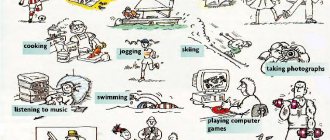“Going to the theater” - essay
Option 1
One day my parents and I were going to the theater. This trip was organized by my dad; he was always partial to the theater. We argued for a long time about who would wear what, what time we should arrive, what to take with us, and so on. These training camps have exhausted us a little. but my dad said that theater was his dream; as a child, he never missed a single performance. Mom agreed with him and we went.
The foyer was dazzlingly bright and very beautiful, we were surrounded by very elegant men and their companions, everyone was in anticipation of something unusual and smiling. It was my first time at the theater, and everything here surprised me. But still everything was so wonderful.
The bell rang, then another. The performance began. The hall fell silent and I heard the ticking of my mother’s watch. the actors were so important and gallant, they made the audience laugh, said different lines and the audience laughed. It was a comedy. Dad beamed with joy. Mom also smiled and sometimes looked at me.
I liked the performance, this cozy and magnificent hall, soft seats and audience. And the acting, their skill was at the highest level. When the comedy ended, everyone stood up and unanimously applauded the troupe. The performance was a success! In the evening we discussed it for a long time and fell asleep only after midnight, joyful and spiritual.
Option 2
Personally, I was able to formulate an answer to the question of why the theater is becoming less popular and what exactly is the misconception of people who refuse to attend it, only when I visited it myself. The decision to visit the theater was not made spontaneously by me; I thought for a long time before making it. I understood that the theater was becoming a less visited place, but at the same time I heard rave reviews about visiting the theater from people who have authority with me. I always admit that the masses can be wrong and individuals can be right, so I decided to find out for myself what theater is.
And I did not regret that I finally decided to visit it. I decided to go to one of the evening sessions of the local theater, where a performance based on the famous story by Ivan Nechuy-Levitsky called “Kaidashev’s Family” was taking place. It is hardly worth retelling the content of this wonderful story, everyone is already very familiar with it. When visiting a theater, the main thing is not the content itself, but watching the actors play. This game simply had no equal. Never before have I seen such sincere and natural actors. It’s hard to even call it acting, because the visual pictures depicted in this wonderful story simply came to life in front of me. I saw not only the complex and intricate relationships between the people whose roles were played by the actors, but also the way of life of the then Ukrainians and Ukrainian society. All this was very interesting, educational and even exciting. After the end of the performance, I honestly didn’t want to leave the hall and the walls of the theater; I would have happily watched the ongoing story of the Kaidash family for a very long time.
Now that I have visited the theater for the first time, I can confidently recommend visiting it to all other people. And I can certainly say that theater cannot be compared with cinema or anything else, because it is a completely different type of great time. I am very glad that I decided to go to the theater. I think I will visit it many more times.
Option 3
Last Friday my class and I visited the regional academic Ukrainian music and drama theater. When you approach the bright, recently restored ceremonial building of the theater, you immediately understand how this proud long name suits it.
Theater begins with a hanger, that is, with a wardrobe. In the temple of art it is not customary to walk around in outerwear, and therefore we obediently, without jostling, hand over our jackets, hats and scarves to the cloakroom. Then you can clean yourself up in front of a huge, half-wall mirror—there’s enough room for everyone.
We're at the theater. The rich, solemn interior instills in the soul the expectation of something unusual. Even the noisiest guys quietly, without raising their voices, share their impressions. We slowly walk into the hall and take our seats.
Subdued light, the rustle of the hall being filled, the quiet hum of voices. Bright beams of spotlights fall on the stage. The play is about to begin - the eccentric comedy “Chasing Two Hares”, and we will be happy and sad, worried and indignant, watching the performance of the actors - extraordinary people of this wonderful world, where everything is pretend and for real.
Option 4
The first time I went to the opera house was at the age of seven. My grandmother brought me there, deciding that it was time for her grandson to get acquainted with this special type of human culture.
As soon as we crossed the threshold of the building, I froze with delight: a huge hall with majestic columns, stucco decorations and red carpets stretched out in front of me. The thought of a royal palace immediately came to mind. I liked the auditorium even more, and especially the luxurious chandeliers on chains and the orchestra pit.
But then the third bell rang, the lights went out and the action began. I want to say right away that the opera “Iolanta” made a strong impression on me. This is necessary, without a microphone - and sing so loudly! Even louder than an orchestra, and there are about thirty instruments playing there at once!
In addition, the plot itself turned out to be fascinating: a blind girl lives without even knowing about her illness. True, in the end she finds out that all other people are sighted, but she does not despair and is soon cured.
We returned home very happy and spent the entire evening sharing our impressions with our relatives. From that day on, I fell in love with the opera house forever.
This is interesting: Over the last century, science has developed and is developing at a very rapid pace. Currently, scientific knowledge doubles every 10–15 years. Essay on the topic “Glory to science!” About 90% of all scientists who have ever lived on Earth are our contemporaries.
Over the past 300 years, namely the age of modern science, humanity has made a huge leap in its development. About 90% of all scientific and technological achievements have been made in our time. The entire world around us shows how much progress humanity has made.
History of theater in Russia
An essay on the topic of theater must begin with the history of the creation of this unique art form. The origins of street performances in Europe were initially divided into secular and ecclesiastical. The history of theater in Russia originates in village rituals and holidays of pagan significance. Over time, the mystical component disappeared from these actions; they turned into fun performance games.
Amateur street performances were not always comedy-monologues. As a result of collective creativity, simple games began to turn into entire drama-performances. They were kept in memory and retold on long winter evenings to neighbors and acquaintances. They, like fairy tales, were passed down from generation to generation .
The very first performances were performances of buffoons-actors. These were exclusively secular actions. The actors danced, sang, acted out various skits, parodied and joked. All this happened to the accompaniment of musical instruments. Anyone could play on an improvised stage, but only the most skilled became a buffoon. This tradition has been preserved to this day: many want to be artists, but only a few receive universal recognition and love from the audience.
Quite quickly, so-called troupes began to form, where actors united into small stable groups. The first theatrical costumes, masks, makeup appeared, and improvised props began to be used. Basically, the performances were improvisation with the inclusion of pantomime, singing, and circus acts. The actors made fun of the upper strata of society, merchants, wealthy people and representatives of the church. The simple man, the worker, the peasant, was shown on the positive side; he aroused sympathy or admiration.
The performances of buffoons never developed into theatrical ones, but small acting troupes gradually began to appear on stage. The groups moved from one locality to another, giving their performances.
A real stationary theater appeared only in the 17th century, a school theater at the Slavic-Greek-Latin Academy and a court theater at the imperial court. The plays used both secular and biblical themes. The stories were told in verse, and both real and allegorical characters participated.
It is still unknown why Tsar Alexei Mikhailovich Romanov liked the theater, but in the early 70s. he became interested in this type of art. Under him, two scenes were actively functioning: a summer one in the village of Preobrazhenskoye and a winter one in the Kremlin.
The acting team was recruited from the children of bourgeois and clerks, who were given to the education and training of the Moscow Lutheran pastor Gregory. This was the first acting school. She was located in the village. Preobrazhensky.
These were difficult years for the tsar; he tried to unite the lands that had been scattered after the “time of troubles” and various boyar coalitions, to unite the people, and to retain power, which was claimed by many. Therefore, all the performances, although they were called comedies (“The Comedy about David and Goliath”, “The Comedy about David”), but had deep political overtones. And it was these productions that helped the tsar in his fight against the boyars. In the future, Russian theater experiences the following milestones in its development:
- Peter I creates the first public theater open to the public, thereby laying the foundation for this art form.
- Elizaveta Petrovna, encouraging the development of the theater, develops drama. In addition, it organizes numerous masquerade and theatrical performances. The influence of French classicism is felt.
- A fashion for home amateur performances is beginning to emerge. The actors are recruited from servants and serfs. It was customary to send particularly talented people to study with famous foreign theater masters.
- The flourishing of art begins under Catherine II. It is she who establishes an independent Directorate of all court theaters, which includes foreign troupes. In this form, the theater will exist until the end of the Romanov dynasty.
- Two Opera houses and the Bolshoi Kamenny Theater were established in St. Petersburg.
- At the beginning of the 19th century. Numerous amateur theater groups appear, new theaters emerge in various cities, and theater schools are created.
After the October Revolution, all theaters in the country began to belong to the arts department of the State Education Commission, and subsequently they were nationalized.








